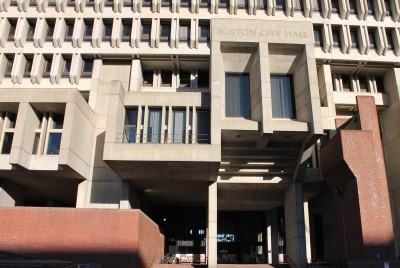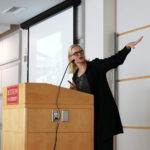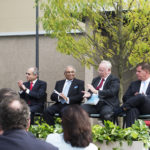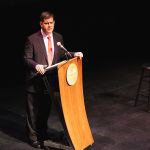
After Boston Globe reporter Andrew Ryan was denied access to federal subpoenas by the City of Boston, Shawn Williams, Massachusetts supervisor of records, ordered Boston Mayor Martin Walsh to acknowledge whether such documents exist and the reasons for their exemption from disclosure, according to a Friday order from Williams.
“The City is hereby ordered, within ten (10) days of this order, to provide Mr. Ryan with a response to the request, provided in a manner consistent with this order, the Public Records Law and its Regulations,” the order stated.
Ryan had requested electronic copies of any records related to a grand jury investigation acquired and provided from the U.S. Attorney’s office since Walsh took office in January 2014, according to a thread of emails disclosed to The Daily Free Press by the Boston Globe reporter.
“If my request is denied in whole or part, I ask that you justify all deletions by reference to specific exemptions of the act,” Ryan wrote in the email.
Laura Oggeri, a spokesperson for Walsh, responded in an email declining the request for disclosure of subpoenas on the grounds of confidentiality.
“If the city were to receive a subpoena from law enforcement and provide information … we would be requested by law enforcement to keep it confidential to preserve the integrity of their investigation,” Oggeri wrote in the email. “Mayor Walsh believes that it is his responsibility to ensure the integrity of the city’s government. He has and will support law enforcement and be respectful of their process, including confidentiality requirements.”
Oggeri’s email did not cite specific exemptions to justify denials of requests.
Ryan asked Oggeri in an email to reconsider the request and filed a petition to the Commonwealth’s Public Records Division, citing the Massachusetts Public Records Law and a 1987 U.S. Court of Appeals ruling, according to Ryan’s reply to Oggeri on April 13.
“Federal rules of criminal procedure say that grand jury witnesses do not have any secrecy obligations,” Ryan wrote in the email. “In fact, prosecutors have been reprimanded for requesting witnesses to keep subpoenas confidential because doing so is contrary to the Criminal Procedure Rules.”
In the Friday order, Williams stated that the custodian of a record should be able to reason the exemption of an ordered request’s disclosure.
“Based on the City’s responses, it is unclear if it possesses any records responsive to Mr. Ryan’s request,” the order stated. “Due to ambiguity regarding the existence of responsive records, I find the City has not met its burden to withhold responsive records, if any, under Exemption (f).”
Fred Bayles, a professor at Boston University’s College of Communication, said although confidentiality and integrity are important in grand jury investigations, public records should be available for public eye, with the exception of specific cases.
“I can see that with grand jury investigations, proceedings are secret,” Bayles said. “They are meant to be for the integrity of the investigation and the protection of those who may be under investigation or called to testify. Speaking as a lifelong journalist, there is no justification for the records [not to be disclosed]. Sometimes they talk about the cost. There shouldn’t be any cost at all.”
Bayles noted that the public records law in Massachusetts is inadequate when compared to other states.
“It is well behind most other states, and there is a move to reform those laws that is now in conference in the committee in the state legislature,” Bayles said. “Specifically, the legislature, the governor’s office and the courts are not covered by the state’s public records law, which is kind of a big squash of government that is not open to the public.”
Several Boston residents agreed that public records should be made accessible for public viewing as an effort to boost transparency.
John Sullivan, 38, of Back Bay, said citizens deserve access to public records in order to evaluate the condition of the city.
“The mayor should be the governing decision-maker on those types of issues or documents,” he said. “I’m not sure if the mayor’s the one responsible for it, but he’s the one communicating it. It seems the mayor is communicating as if he’s not furnishing the documents.”
Emily Munro-Ludders, 23, of Fenway, said despite her unfamiliarity with the matters pertaining to public records, she takes information as a beneficial resource.
“Information is a very valuable resource,” she said. “Sharing information is a very important aspect of making the country work.”
Christopher Whitney, 27, of Brighton, said the city should comply with public records requests and facilitate the process with digitization.
“Generally, if it’s a reasonable request, it should be met,” he said. “Given the resources and population that Boston has, it should move to be a leader in this area, in digitizing documents, making it a digital archive that is transparent [and] that people have access to.”




